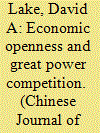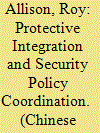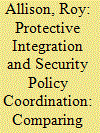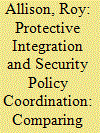|
|
|
Sort Order |
|
|
|
Items / Page
|
|
|
|
|
|
|
| Srl | Item |
| 1 |
ID:
160726


|
|
|
|
|
| Summary/Abstract |
The United States–China relationship is more likely than not to slide into economic and military competition, despite the perhaps best intentions of both states. This new bipolar competition is not inevitable. The key question is whether both governments have the self-restraint to limit domestic rent-seeking interests who will undoubtedly demand protection at home and exclusivity in their spheres of influence abroad. If not, the new superpowers will, like great powers in the past, ‘race’ for economic privileges that can quickly divide the world up into exclusive blocs. Like the security dilemma, great powers need not actually exclude one another from their economic zones; the fear of exclusion alone is enough to ignite the process of division. There was always some likelihood of a competitive economic spiral given China’s close business–government relations in a ‘state-capitalist’ economy. Now, for the first time in seven decades, there is a chance that the United States, in the grips of economic nationalism, might abandon its historic policy of free trade and ignite a new race for economic privilege as well.
|
|
|
|
|
|
|
|
|
|
|
|
|
|
|
|
| 2 |
ID:
160727


|
|
|
|
|
| Summary/Abstract |
Are countries concerned about the impact on interstate commerce of security externalities? Trade often makes countries vulnerable to the vagaries of the international market and shifts the power relationship between partner countries. The volume of trade, however, has increased enormously over time. We examine how interstate rivalry affects interstate trade. An extensive literature examines the role of interstate security in shaping interstate commerce but pays little attention to that of rivalry. Similarly, the thriving rivalry literature has yet to explore the role of rivalry in non-security interstate relations such as trade. We aim to fill this gap. We argue that rivalry deters trade activities, and that this tendency is intensified amid deeper and more competitive rivalry. Using a global sample from 1949 to 2000, we find that rival dyads trade less than others, and that the negative impact of this on equal-power dyads is greater than that for unequal-power pairs.
|
|
|
|
|
|
|
|
|
|
|
|
|
|
|
|
| 3 |
ID:
160730


|
|
|
|
|
| Summary/Abstract |
This article contributes to research on non-Western regionalism by examining the function of security policy coordination in two macro-regional organisations in Eurasia, which include the primary non-Western powers: the Shanghai Cooperation Organisation (SCO)—with China and Russia—and the Collective Security Treaty Organisation (CSTO)—with Russia. The SCO has wider formal functions, and the CSTO is more hierarchical in practice, but both claim to be regional security providers with a focus on Central Asia. It is puzzling that Member States stress the importance of these organisations, that there have been regular meetings for over 15 years, yet their functionality is low judging by their ability to implement various ambitious projects. This article offers the explanation for this in the focus of SCO and CSTO Member State leaders on the interaction between domestic political, and regional security priorities. As a result, these bodies express the phenomenon of ‘protective integration’.
|
|
|
|
|
|
|
|
|
|
|
|
|
|
|
|
| 4 |
ID:
160728


|
|
|
|
|
| Summary/Abstract |
This article contributes to research on non-Western regionalism by examining the function of security policy coordination in two macro-regional organisations in Eurasia, which include the primary non-Western powers: the Shanghai Cooperation Organisation (SCO)—with China and Russia—and the Collective Security Treaty Organisation (CSTO)—with Russia. The SCO has wider formal functions, and the CSTO is more hierarchical in practice, but both claim to be regional security providers with a focus on Central Asia. It is puzzling that Member States stress the importance of these organisations, that there have been regular meetings for over 15 years, yet their functionality is low judging by their ability to implement various ambitious projects. This article offers the explanation for this in the focus of SCO and CSTO Member State leaders on the interaction between domestic political, and regional security priorities. As a result, these bodies express the phenomenon of ‘protective integration’. It is a phenomenon that does not offer substantive regional integration or emphasise collective-action problem solving. It is intended to be sovereignty enhancing and to bolster regime security, stability, and legitimacy. It fosters a culture of interaction, normative bonding, and collective political solidarity. This is confirmed in empirical analysis of SCO and CSTO discourse and agreements over counter-terrorism, information security, and foreign policy coordination. However, the bonds of protective integration have weakened as separatism has become a divisive issue since 2014 over Russian action in Ukraine. Moreover, organisational enlargement of the SCO further threatens its cohesion, while it is being displaced by the belt and road initiative in the wider context of Chinese foreign and economic policy priorities. Neither the SCO nor the CSTO are likely to be dissolved, but their purposes are likely to become more diffuse.
|
|
|
|
|
|
|
|
|
|
|
|
|
|
|
|
| 5 |
ID:
160729


|
|
|
|
|
| Summary/Abstract |
This article contributes to research on non-Western regionalism by examining the function of security policy coordination in two macro-regional organisations in Eurasia, which include the primary non-Western powers: the Shanghai Cooperation Organisation (SCO)—with China and Russia—and the Collective Security Treaty Organisation (CSTO)—with Russia. The SCO has wider formal functions, and the CSTO is more hierarchical in practice, but both claim to be regional security providers with a focus on Central Asia. It is puzzling that Member States stress the importance of these organisations, that there have been regular meetings for over 15 years, yet their functionality is low judging by their ability to implement various ambitious projects. This article offers the explanation for this in the focus of SCO and CSTO Member State leaders on the interaction between domestic political, and regional security priorities. As a result, these bodies express the phenomenon of ‘protective integration’. It is a phenomenon that does not offer substantive regional integration or emphasise collective-action problem solving. It is intended to be sovereignty enhancing and to bolster regime security, stability, and legitimacy. It fosters a culture of interaction, normative bonding, and collective political solidarity. This is confirmed in empirical analysis of SCO and CSTO discourse and agreements over counter-terrorism, information security, and foreign policy coordination. However, the bonds of protective integration have weakened as separatism has become a divisive issue since 2014 over Russian action in Ukraine.
|
|
|
|
|
|
|
|
|
|
|
|
|
|
|
|
| 6 |
ID:
160731


|
|
|
|
|
| Summary/Abstract |
While territorial disputes have long been considered essential in the study of inter-state conflict, the existing literature has largely overlooked the actual initiation of territorial disputes in the first place. The conventional wisdom holds that, given that the anticipated consequences of dispute escalation are likely to be worse for weaker states than for stronger states, the former should be less likely than the latter to initiate a dispute. However, a large proportion of territorial disputes have in fact been initiated by weaker states. Why does a weaker state initiate a territorial claim over its relatively stronger counterpart? Drawing insights from the work on reputation building in the recent inter- and intra-state conflict literature, this article provides an explanation that focuses on the role of information and uncertainty in the initiation of territorial disputes.
|
|
|
|
|
|
|
|
|
|
|
|
|
|
|
|
|
|
|
|
|